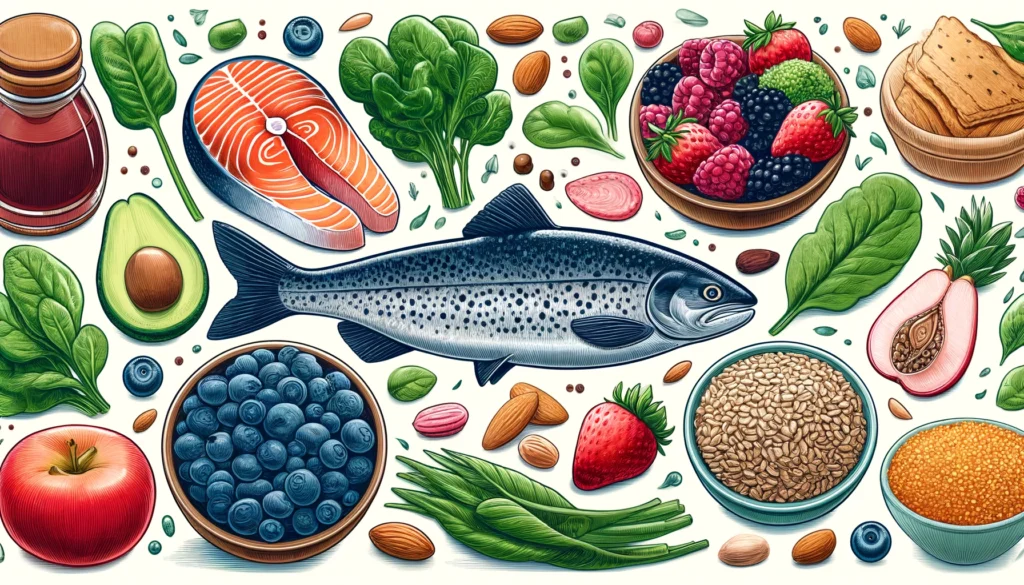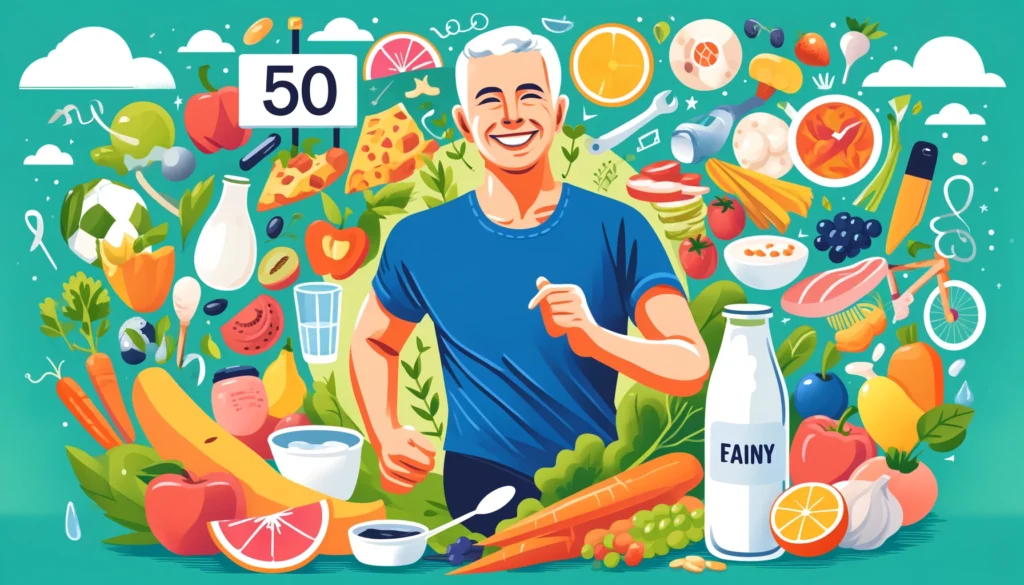Date: 5-26-2024
Reaching your 50s is a significant milestone, bringing with it unique health considerations and nutritional needs. Eating the right foods can help you maintain energy levels, support bone health, enhance cognitive function, and prevent chronic diseases. Here are five of the best foods to incorporate into your diet during this pivotal decade:
1. Fatty Fish
Fatty fish, such as salmon, mackerel, sardines, and trout, are rich in omega-3 fatty acids, which are essential for heart health. These healthy fats help reduce inflammation, lower blood pressure, and decrease the risk of heart disease—conditions that become more prevalent with age.
Benefits:
- Heart Health: Omega-3s help maintain healthy cholesterol levels and reduce the risk of heart attack and stroke.
- Brain Function: These fatty acids support cognitive function and may reduce the risk of Alzheimer’s disease and dementia.
- Joint Health: Omega-3s have anti-inflammatory properties that can help alleviate symptoms of arthritis and other joint issues.
How to Include Fatty Fish in Your Diet:
- Grill, bake, or broil salmon fillets for a delicious and heart-healthy main course.
- Add sardines to salads or whole-grain crackers for a nutritious snack.
- Incorporate mackerel into pasta dishes or stews for a flavorful boost of omega-3s.
2. Leafy Greens
Leafy greens like spinach, kale, Swiss chard, and collard greens are nutritional powerhouses loaded with vitamins, minerals, and antioxidants. They are particularly high in calcium, vitamin K, and magnesium, which are crucial for bone health.
Benefits:
- Bone Health: Calcium and vitamin K work together to maintain bone density and reduce the risk of osteoporosis.
- Eye Health: Antioxidants like lutein and zeaxanthin protect against age-related macular degeneration.
- Detoxification: Leafy greens support liver function and aid in the body’s natural detoxification processes.
How to Include Leafy Greens in Your Diet:
- Add spinach or kale to smoothies for a nutrient-packed breakfast.
- Sauté Swiss chard or collard greens with garlic and olive oil for a tasty side dish.
- Use a mix of leafy greens as the base for salads, topped with colorful vegetables and lean proteins.
3. Berries
Berries such as blueberries, strawberries, raspberries, and blackberries are rich in antioxidants, vitamins, and fiber. These small fruits pack a big punch when it comes to health benefits, particularly for heart and brain health.
Benefits:
- Antioxidant Power: Berries are high in antioxidants that combat oxidative stress and inflammation.
- Cognitive Health: Regular consumption of berries has been linked to improved memory and cognitive function.
- Digestive Health: The fiber in berries supports a healthy digestive system and can help regulate blood sugar levels.
How to Include Berries in Your Diet:
- Top your morning yogurt or oatmeal with a handful of fresh berries.
- Blend berries into smoothies for a refreshing and nutritious drink.
- Enjoy berries as a sweet and healthy snack on their own.
4. Nuts and Seeds
Nuts and seeds, including almonds, walnuts, flaxseeds, and chia seeds, are excellent sources of healthy fats, protein, fiber, vitamins, and minerals. They provide a range of health benefits that are particularly important in your 50s.
Benefits:
- Heart Health: Nuts and seeds are rich in unsaturated fats that help maintain healthy cholesterol levels.
- Bone Health: They contain calcium, magnesium, and phosphorus, which are essential for maintaining bone density.
- Brain Health: Nuts like walnuts are high in omega-3 fatty acids and antioxidants, which support cognitive function.
How to Include Nuts and Seeds in Your Diet:
- Add a handful of nuts or seeds to your salads, oatmeal, or yogurt for added crunch and nutrition.
- Use ground flaxseeds or chia seeds in smoothies, baked goods, or as a topping for cereal.
- Snack on a mix of nuts and seeds for a convenient and nutrient-dense option.
5. Whole Grains
Whole grains, such as quinoa, brown rice, oats, and barley, are packed with fiber, vitamins, and minerals. Unlike refined grains, whole grains retain all parts of the grain, providing more nutrients and health benefits.
Benefits:
- Digestive Health: The fiber in whole grains promotes regular bowel movements and helps prevent constipation.
- Heart Health: Whole grains help reduce the risk of heart disease by lowering cholesterol levels and improving blood pressure.
- Weight Management: High-fiber foods help you feel fuller for longer, aiding in weight management and preventing overeating.
How to Include Whole Grains in Your Diet:
- Start your day with a bowl of oatmeal topped with fresh fruit and nuts.
- Use quinoa or brown rice as a base for salads or grain bowls.
- Incorporate barley into soups and stews for added texture and nutrition.
Conclusion
Incorporating these five superfoods into your diet can provide significant health benefits as you navigate your 50s. Fatty fish, leafy greens, berries, nuts and seeds, and whole grains each offer unique nutrients that support heart health, bone density, cognitive function, and overall well-being. By making these foods a regular part of your meals, you can enhance your health, maintain vitality, and enjoy this vibrant stage of life to its fullest.



